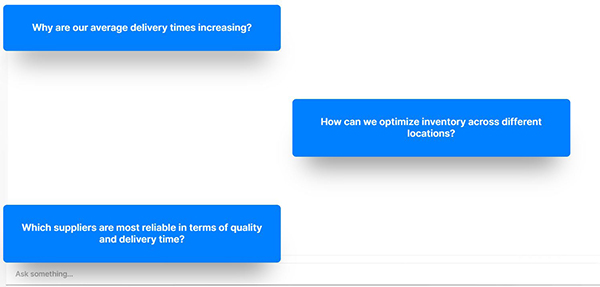The convergence of genAI with data analytics is allowing supply chain teams to solve biggest business problems.

By Alon Goren, CEO and Co-Founder, AnswerRocket
As we saw during the COVID pandemic, the supply chain is the backbone of every economy. On a micro level, the supply chain is also the backbone of every retail and CPG business. A well-managed supply chain ensures that these businesses can reliably deliver their products to consumers across all markets while lowering the cost of those goods and improving the quality of their inventory. Effectively managing a supply chain is all about effectively leveraging data – data analytics unlocks critical learnings and recommendations that can improve every KPI for logistics teams.
Traditional analytics platforms have been at these organizations’ disposal for decades. But now there’s a new twist: Large Language Models. LLMs are taking data analytics to a whole new level. The combination of LLMs with analytics technologies gives these organizations capabilities to uncover compelling new insights and drive better outcomes.

The LLM revolution is helping supply chain teams and logistics firms by making data analysis available to more people within these organizations. GenAI analytics platforms are democratizing advanced diagnostic, predictive, and prescriptive analytics. In the past, analyzing data required some measure of technical expertise. Line of business users needed a good understanding of the data hierarchy and SQL know-how to manually analyze their business data.
Unsurprisingly, this was a cumbersome process that made it difficult for most employees to analyze and glean insights from their data. Thus, business users in the supply chain logistics and other sectors were heavily reliant on their more technical colleagues to field their analytics requests—often creating bottlenecks for these critical insights and impeding data-driven decision-making. When it came to heavy-duty data analysis, this often required engaging data scientists to develop purpose-built machine learning models.
LLMs have helped remove these technical barriers for business users. Now, general business users can employ LLM analytics platforms to easily explore and learn from their data. Thanks to the advanced natural language processing capabilities that underpin these LLMs, users can ask questions in their own words and get accurate answers quickly. There’s no need to write SQL, prepare data, or click through workflows. The LLM component allows them to easily interact with the analytics layer and delivers users insights they can readily digest.
For supply chain management, this means answering questions like:
AI applications are being built on top of LLMs, and these applications are increasingly becoming specialized.
At a high level, this means supply chain organizations are not limited to using generic LLM tech like ChatGPT or Gemini for data interaction, which may not effectively meet their specific requirements. Instead, they can look to the growing number of generative AI applications and assistants that leverage these foundation models.
An intelligent LLM will try to give users convincing answers that it thinks sound good within the conversation’s context. A generative AI application’s job is to make sure these are the right answers for the given use case. Furthermore, an effective AI application (or AI agent) will automatically combine the best data sources and tools for the job to provide a comprehensive answer. This is a game changer compared to basic chat answers from the big LLMs.
These apps are being built for specific sectors. This includes supply chain logistics, retail, finance, healthcare, and so on. They are tuned to the domain, lexicon, and analysis methods, ensuring that they provide deeper, more reliable, and more valuable insights compared to general-purpose models. This customization goes beyond industry. These apps can be tailored to support specific roles or business divisions within a given segment. For example, these tools might be designed for supply chain analysts in e-commerce, marketing executives in healthcare, or underwriting agents in insurance.
Specialized generative AI apps ultimately enable supply chain teams to focus on solving unique business challenges and driving highly targeted outcomes. This could look like:
Highly specialized generative AI apps allow for greater precision and engender more confidence in the AI’s recommendations.
From planning to production to product delivery, the supply chain is complicated by many variables that make its effective management a major challenge for businesses. Data has all the insights these organizations need to make the right decisions and improve performance. But penetrating this data has always been troublesome in the past. The combination of LLMs with analytics and the rise of genAI apps have changed the equation, giving entire supply chain teams instant access to insights and recommendations that support better business outcomes.

As CEO and founder of AnswerRocket, Alon leads product innovation to bring actionable analytics to business people, so they can get their questions answered faster. Prior to founding AnswerRocket, Alon co-founded and was Chief Technology Officer of Radiant Systems for 25 years.
Scott Ellyson, CEO of East West Manufacturing, brings decades of global manufacturing and supply chain leadership to the conversation. In this episode, he shares practical insights on scaling operations, navigating complexity, and building resilient manufacturing networks in an increasingly connected world.